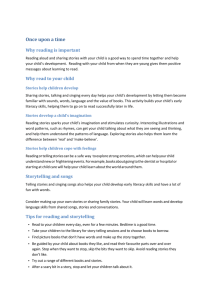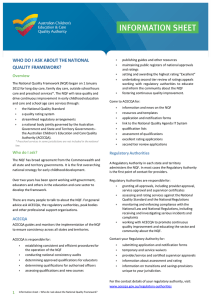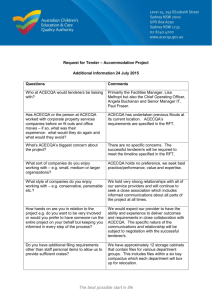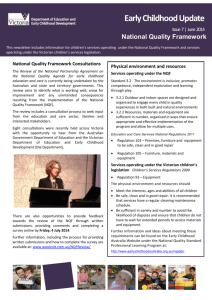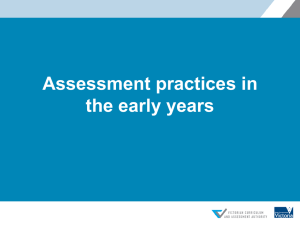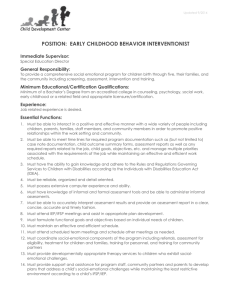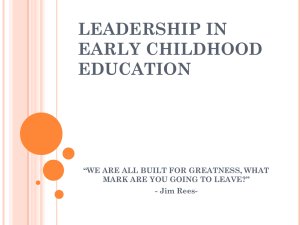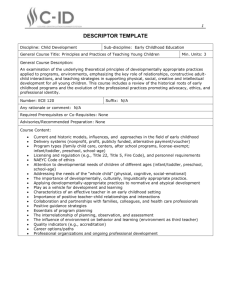AA Policy Manual Intro draft 1 website
advertisement
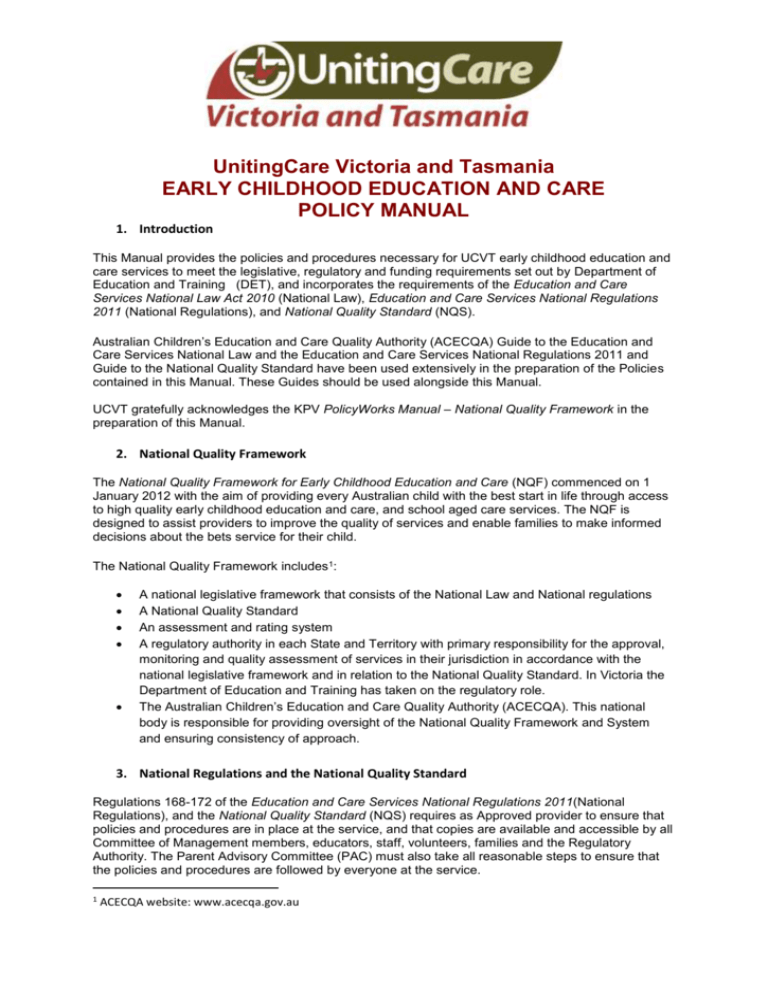
UnitingCare Victoria and Tasmania EARLY CHILDHOOD EDUCATION AND CARE POLICY MANUAL 1. Introduction This Manual provides the policies and procedures necessary for UCVT early childhood education and care services to meet the legislative, regulatory and funding requirements set out by Department of Education and Training (DET), and incorporates the requirements of the Education and Care Services National Law Act 2010 (National Law), Education and Care Services National Regulations 2011 (National Regulations), and National Quality Standard (NQS). Australian Children’s Education and Care Quality Authority (ACECQA) Guide to the Education and Care Services National Law and the Education and Care Services National Regulations 2011 and Guide to the National Quality Standard have been used extensively in the preparation of the Policies contained in this Manual. These Guides should be used alongside this Manual. UCVT gratefully acknowledges the KPV PolicyWorks Manual – National Quality Framework in the preparation of this Manual. 2. National Quality Framework The National Quality Framework for Early Childhood Education and Care (NQF) commenced on 1 January 2012 with the aim of providing every Australian child with the best start in life through access to high quality early childhood education and care, and school aged care services. The NQF is designed to assist providers to improve the quality of services and enable families to make informed decisions about the bets service for their child. The National Quality Framework includes 1: A national legislative framework that consists of the National Law and National regulations A National Quality Standard An assessment and rating system A regulatory authority in each State and Territory with primary responsibility for the approval, monitoring and quality assessment of services in their jurisdiction in accordance with the national legislative framework and in relation to the National Quality Standard. In Victoria the Department of Education and Training has taken on the regulatory role. The Australian Children’s Education and Care Quality Authority (ACECQA). This national body is responsible for providing oversight of the National Quality Framework and System and ensuring consistency of approach. 3. National Regulations and the National Quality Standard Regulations 168-172 of the Education and Care Services National Regulations 2011(National Regulations), and the National Quality Standard (NQS) requires as Approved provider to ensure that policies and procedures are in place at the service, and that copies are available and accessible by all Committee of Management members, educators, staff, volunteers, families and the Regulatory Authority. The Parent Advisory Committee (PAC) must also take all reasonable steps to ensure that the policies and procedures are followed by everyone at the service. 1 ACECQA website: www.acecqa.gov.au The Australian Children’s Education and Care Quality Authority (ACECQA) have produced a Guide to the Education and Care Services National Law and the Education and Care Services National Regulations 2011. The Guide indicates that: policies should be informed the by service’s philosophy statement, Early Childhood Australia’s Code of Ethics and current advice from recognised authorities. In the National Quality Standard, Quality Area 7 – Leadership and Service Management – Element 7.3.5. requires that: service practices are based on effectively documented policies and procedures that are available at the service and reviewed regularly. 4. Purpose Clearly articulated policies and procedures are needed in order to: Provide a framework for service operation Enable a consistent approach Provide future direction for decision making and assist in the resolution of difficulties Promote smooth transition where there are changes to management or staff Provide a framework for compliance with legislative and regulatory obligations Improve the management of risk Guide day-to-day practice and decision making Act as a tool for marketing the service’s program, outlining what new and potential users of the service can expect Confusion, conflict and poor decision making can result where there is no guidance from policies.2 5. Implementation of Policies and Procedures In the case of all policies contained in this Manual, the service’s Parent Advisory Committee (PAC) needs to implement the policies by: Making each policy available to those who require it Informing and training educators, PAC members, parents/guardians, children and others impacted by the policy/policy change Updating/ publicising the policy in the service’s communications, including files, brochures, newsletters, websites, information nights etc. Giving 14 days’ notice to parents before making any change to a policy or procedure that would affect fees, have a significant impact on any child, or affect a family’s ability to use the service. This is a legal requirement under the National Regulations. Monitoring the implementation of new or revised policy to measure its impact and determine whether it is meeting intended outcomes. It is also important to ensure that there are no unintended consequences or difficulties with the policy which may require modification or discontinuation.3 6. Review of Policies and Procedures The NQS indicates that the review of policies and procedures should take place in collaboration with families. Establishing a policy sub-committee can be an effective way to develop and review policies. Utilising key people from service stakeholder groups with a range of skills, knowledge and perspectives contributes to the effective development and review of policies. 2 3 PolicyWorks Manual – National Quality Framework. Kindergarten Parents Victoria 2012 Op Cit Click here to enter text. Early Childhood Education and Care Policy Manual Policies and procedures should be reviewed regularly in order to meet changing needs and comply with legislation. The policies in this Manual include a review date at the end of each policy. This represents the latest date for review of the policy. However, policies can be prioritised for review according to how often the content is expected change. Other triggers for a review include a legislative change or a serious incident at the service. Policies should be up to date with current research and contemporary views on best practice, and support a shared understanding of a service’s practices (NQS Element 7.3.5). 7. Definitions 7.1 Commonly used terms For commonly used terms, such as Approved Provider, Nominated Supervisor, Regulatory Authority, etc., please refer to the General Definitions section of this Manual. 7.2 Other relevant terms Policy: A formal statement of principles which provides a framework for decision making and indicates the course of action to be taken in specific circumstances. Polices provide services with an approved way of operating in relation to particular matters and improve the management of risk. They reflect the service philosophy, current thinking, national standards and community expectations, and are relevant in terms of current laws and regulations. Procedures: The steps required to implement and comply with a policy. They specify how to achieve the necessary result by outlining who does what and when. Procedures are succinct, factual and to the point, and might generally be expressed as a list. 4 4 Op Cit Click here to enter text. Early Childhood Education and Care Policy Manual
